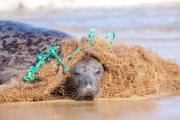

Subscríbete al SCP News
Preventing, halting and reversing the degradation of ecosystems: how does SCP/RAC contribute to the Mediterranean efforts on ecosystem restoration

At the occasion of the World Environment Day (5th June), the UN Environment Programme is launching the UN Decade on Ecosystem Restoration as a global rallying cry to heal our planet., recalling for the need to recreate, initiate, or accelerate the recovery of an ecosystem that has been disturbed.
Home to million and hosting 7–10% of the world’s marine biodiversity, the Mediterranean Sea is not immune to ecosystem degradation. Actions must be taken at different level to restore them and to reimagine a better future for our region.
The healthier our ecosystems are, the healthier our Mediterranean Region - and its inhabitant.
Preventing, halting and reversing the degradation of ecosystems: how does SCP/RAC contribute to the Mediterranean efforts on ecosystem restoration:
- Moving from knowledge to concrete on-site actions and thus preventing the degradation of protected ecosystems
Marine litter represents a pervasive and persistent problem that knows no boundaries. It has a negative impact on vital economic sectors such as fisheries, aquaculture, navigation, energy and tourism, while it may endanger human health and safety. It has been acknowledged as a major threat in many Mediterranean Marine Protected Areas (MPAs) hampering the achievement of their conservation goals and MPA Managers lack the tools and knowledge to effectively address the issue at their level and prevent the problem from getting worse.
Through the Plastic Busters MPAs project, SCP/RAC provides direct support to 3 Marine Protected Areas located in Italy and Spain by setting-up and implementing marine litter prevention and mitigation measures. Concretely, SCP/RAC is working in Spain with the Natural Park of Ebro Delta to set up a reusable cup delivery system for beach bars and festivals, and with the Natural Park of Cabo de Gata-Níjar on the development of a network of collection points for beverage containers made of PET, can and glass. These items were found among the most frequently found at the coastline of the Parks and their reduction has been identified as a priority action within the park’s Marine Litter Action Plan. In Italy, mussel nets and pieces of mussel nets appeared to be among the most frequently found items on the coastline of the Miramare MPA, therefore the selected measures being implemented by SCP/RAC in this MPA aims at promoting the sustainable management of mussel farming nets by raising awareness of the aquaculture sector on the problem of marine litter and exploring the option of alternative materials.
- Shining a light and rewarding green entrepreneurs who are thriving for green recovery and the restoration of Mediterranean ecosystems
Production and consumption patterns in the Mediterranean region, in combination with demographic growth, urbanization, and rising living standards, have led to an increase in resource depletion and environmental degradation. This adds to inefficient industrial processes and unsustainable waste management, putting further pressure on the natural resources on which Mediterranean economies depend. A transition towards more sustainable pathways is urgently needed. By integrating the environmental, economic and social spheres, sustainable businesses are key drivers for the transition towards a green, circular and blue economy in the Mediterranean, but they need an enabling policy environment to thrive.
Within the framework of the SwitchMed programme, SCP/RAC is launching the first edition of WeMed, the Mediterranean Sustainability Award. WeMed is a Flagship Initiative of the Mediterranean strategy for Sustainable Development (MSSD), a strategic guiding document adopted by the Contracting Parties of the Barcelona Convention, for all stakeholders to translate the 2030 Agenda for Sustainable Development at the regional, sub-regional and national levels of the Mediterranean region. It aims at promoting an inclusive transition to sustainability in the Mediterranean and recognizing success stories of innovative green entrepreneurs from Southern Mediterranean countries who are thriving for green recovery and the restoration of Mediterranean ecosystems, as well as the efforts undertaken by other actors in the entrepreneurship ecosystem to support them (public authorities, financial institutions, business support organisations or civil society organisations). The call for applications will open soon and the names of the winners will be known during an Award ceremony to be organized in October.
- Bending the curve of ecosystem degradation by accelerating the transition to non-polluting, social inclusive and circular economies
The development of a green economy in the Mediterranean area to combat environmental degradation represents a great opportunity for jobs creation, particularly for young graduates and women who are three times less likely to be employed than men. Strengthening eco-innovative entrepreneurship is a recognised solution even though green ventures face a complex set of challenges including limited access to funding, underdeveloped markets and fragmented support from sector stakeholders.
With the EU funded project GIMED, led by SCP/RAC, there will be 100 capacity-building initiatives dedicated to entrepreneurs on eco-design and green business modelling and 200 coaching sessions on access to finance and markets. Highlighting the stories behind the projects and entrepreneurs and their impact on society is a key opportunity for the #GenerationRestoration campaign and GIMED is joining with a microcampaign on Facebook and Twitter.
- The Switchers: Generation Restoration
The Switchers is a community of inspiring green entrepreneurs and changemakers in the Mediterranean region. Switchers are individuals, enterprises or civil society organisations implementing innovative ecological and social solutions that contribute to a switch to sustainable and fair consumption and production models, essential to the recovery of ecosystems.
For the Switchers, circular economy solutions are at the heart of their business models and also inspire them to seek ways to innovate and achieve even higher levels of environmental sustainability in the design of products and services they provide. Together, these important economic actors are making significant progress towards one of the region’s key sustainable development objectives: to accelerate the shift to more sustainable modes of consumption and production. In doing so, they are setting a positive example of how economic growth can also lead to protection of the Mediterranean, its precious, limited natural resources and its ecosystems.














